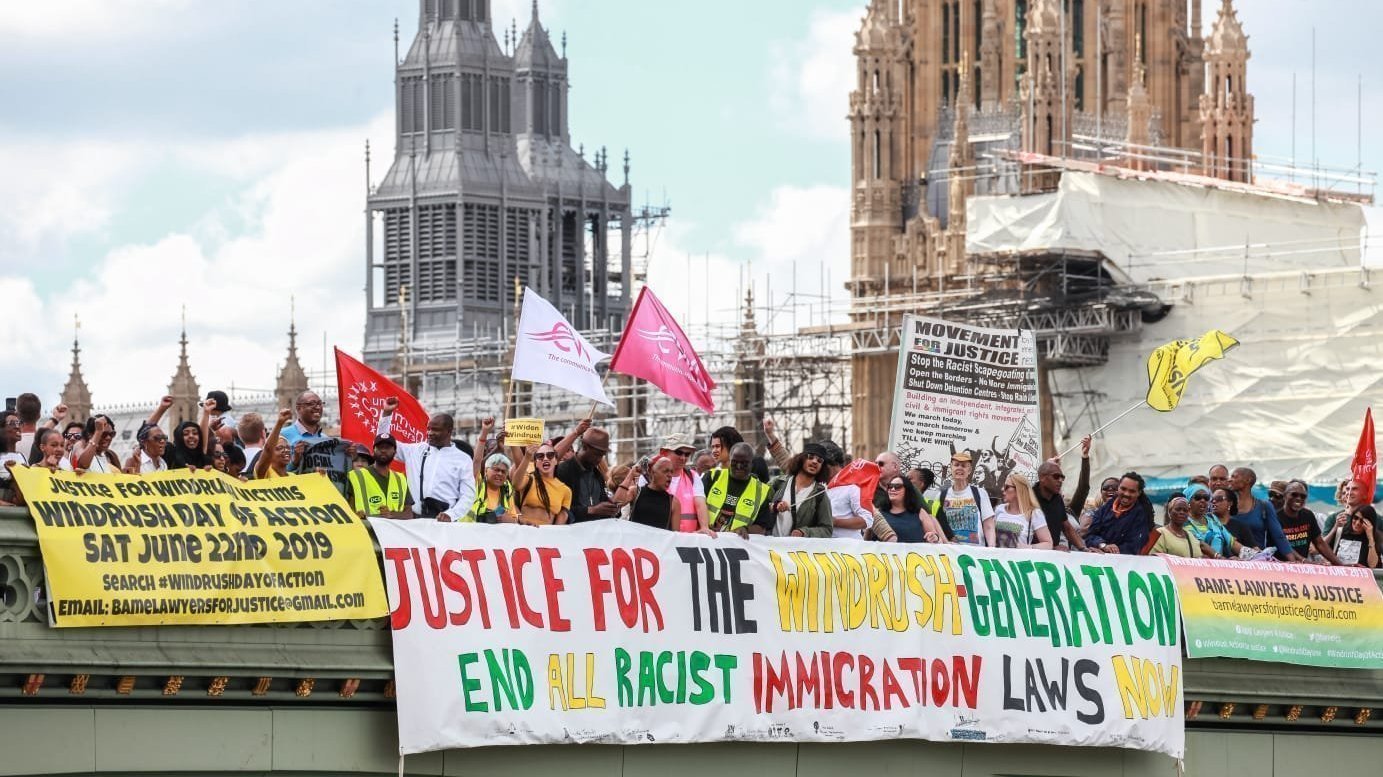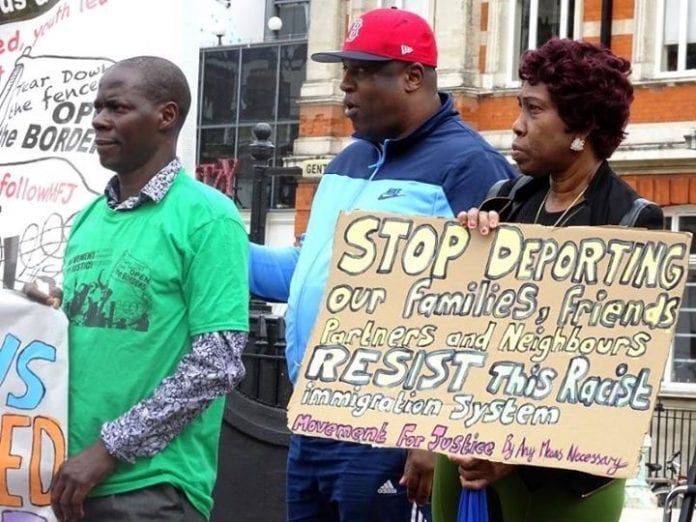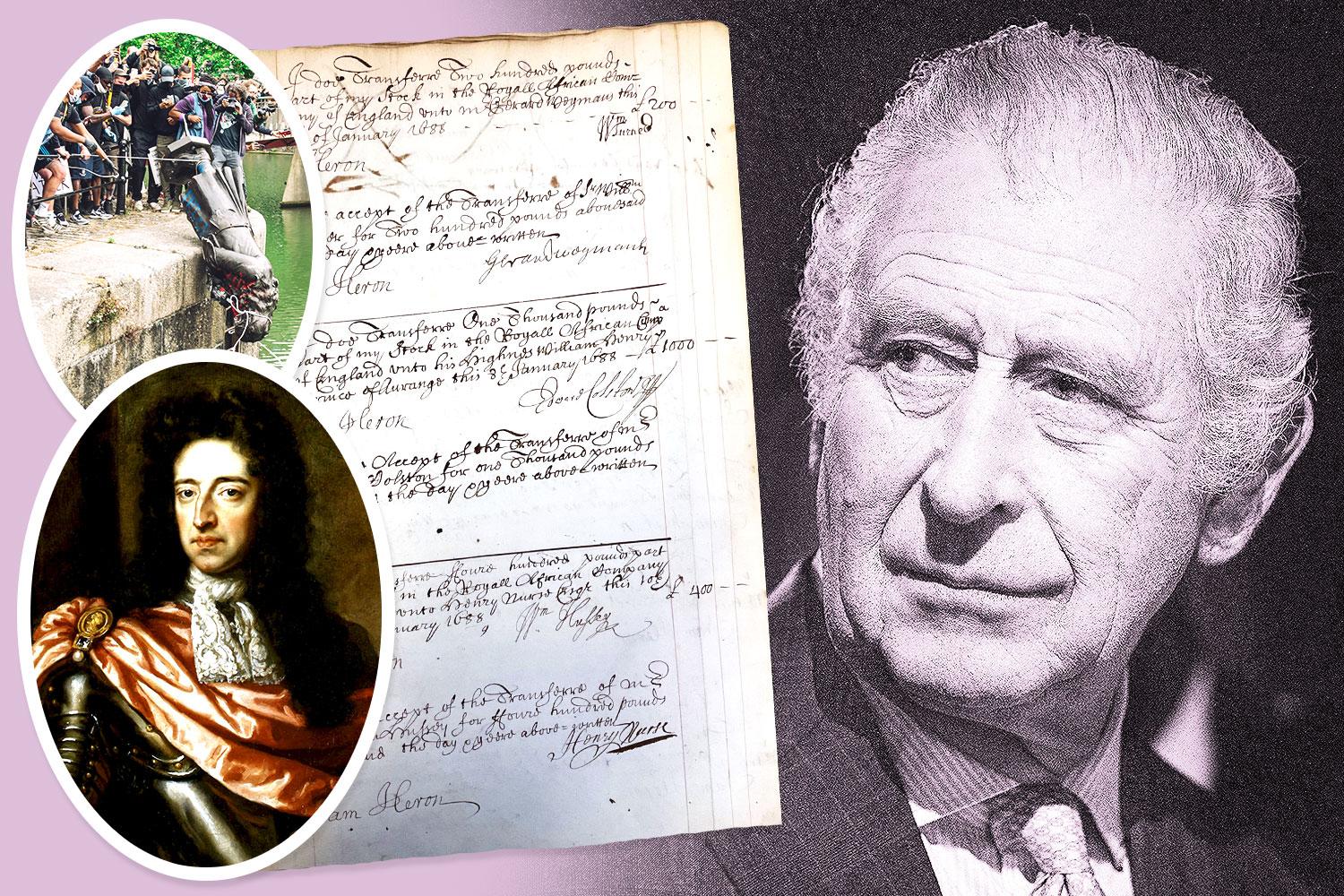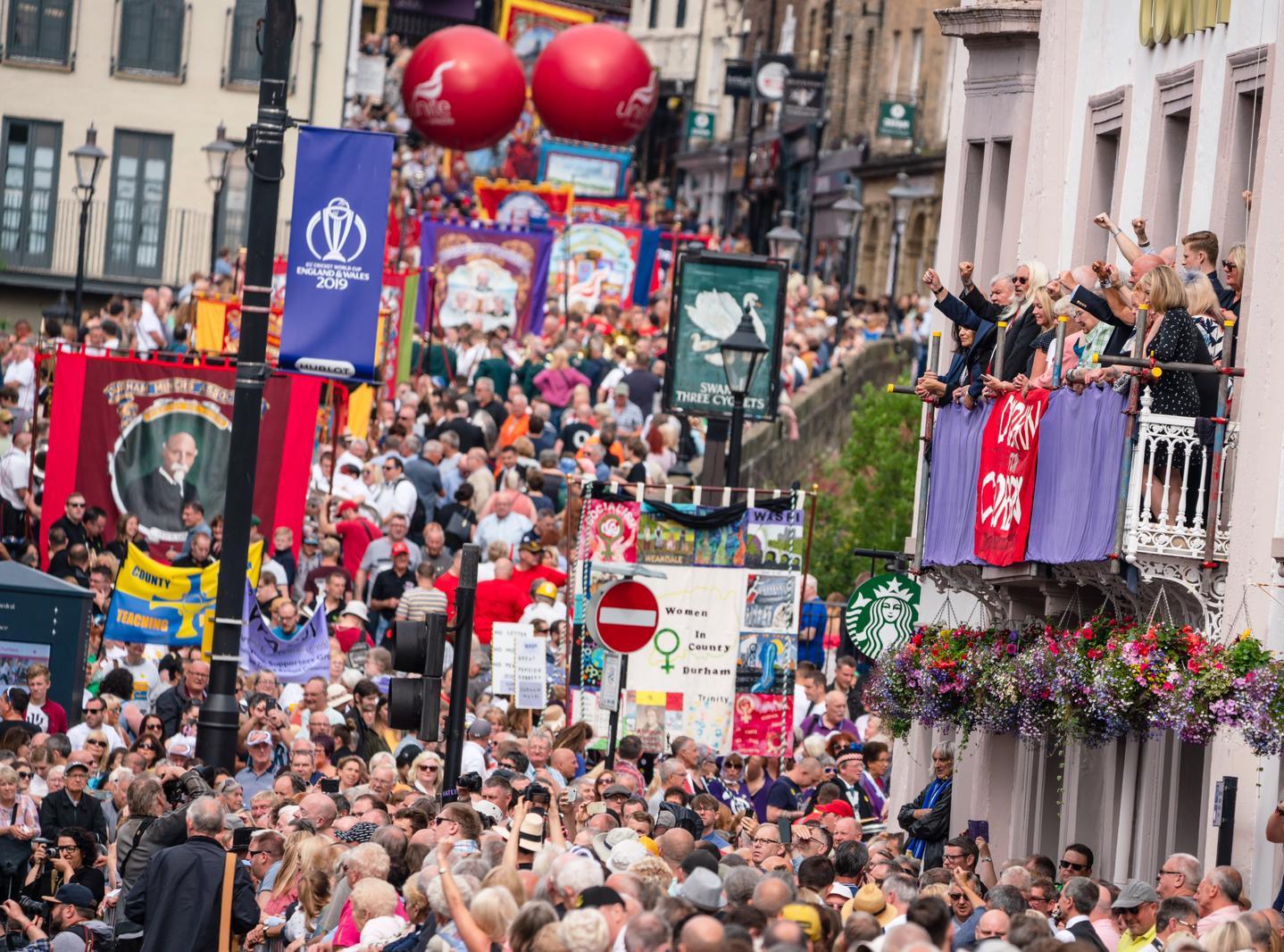
 |
||||
|---|---|---|---|---|
| Volume 53 Number 18, June 17, 2023 | ARCHIVE | HOME | JBCENTRE | SUBSCRIBE |
Workers' Weekly Internet Edition: Article Index : ShareThis
Junior Doctors' Three-day Strike:
The Watchword Must Be Unity of All Health Workers to Continue their ResistanceWindrush 75:
The "Windrush Generation Scandal"
King of Slavery Praises a "Very Special Generation"Durham Miners Gala:
Durham Miners Gala 2023 Arrangements Confirmed

Photo: BBC
On Wednesday, June 14, 47,600 junior doctors, members of the British Medical Association (BMA), have continued their just struggle for pay restoration with their third strike in 2023. The junior doctors make up 40% of medical professionals in the NHS and range from trainees to doctors operating at senior levels with more than 10 years' experience, such as Registrars. The doctors have been demanding a 35% pay rise due to 15 years of real-terms pay cuts. Junior doctors' inflation-adjusted pay has fallen by 26% since 2008, leading to a crisis in recruitment and retention, according to the BMA. The strike is for 72 hours and part of a united and continued resistance of all health workers to ongoing attacks on their pay and working conditions.

Photo: SSTHC
Since the junior doctors' last strike in April, the government had refused to enter into any meaningful negotiations with the BMA. Some talks took place in May with Steven Barclay, Health Secretary. Of those talks [1], Dr Vivek Trivedi and Dr Robert Laurenson, the co-chairs of the BMA's junior doctors committee, said: "We made proposals showing our willingness to be creative and work with the government on how the reversal of our pay erosion could be achieved. In the end, however, the government would simply not accept the fundamental reality of the pay cuts junior doctors have faced. This was made clear when they finally made their pay offer of 5%. Not only is that nowhere near addressing pay erosion over the last 15 years, it would not even have matched inflation this year."
Last year the government had previously offered to all health workers through its Pay Review Boards pay "increases" of around 3.5%, well below inflation. This was a huge insult to all health workers who had suffered in previous years through government "pay restraint". Health workers, like the transport and other workers, have had enough. Therefore, it was no surprise that this provocative attack by the government on the living standards of health workers, as well as the increased workload imposed by cuts to services, would be rejected.
When the government arrogantly refused to negotiate with nurses in RCN, ambulance staff in Unite, GMB and UNISON, and junior doctors in the BMA, the health workers launched their strike actions. These strikes have steadily gained huge support from people across the country. In March, far from entering into meaningful negotiations with all health workers and their unions, the government made a divisive "take-it-or-leave-it" offer of around a 5% salary increase, with higher uplift for low paid staff and with an immediate one-off payment of around £1,500 depending on pay levels. Also with this "pay offer" was the continued refusal of government to enter into any further negotiations before the unions ended their strike action.

This arbitrary nature of government does not even recognise the reality of the pay concerns of health workers and does not listen to them, or recognise their voice in decision-making. The government does not recognise that the issue of pay restoration for medical and nursing staff is even an issue, let alone entering into negotiations on how it can be resolved. The outlook of the doctors and nurses is centred on the reality that a healthy society needs a modern public health service with adequate all-round funding, investment and justly paid health workers and professionals. It is the opposite of the arbitrary outlook of the government and ruling elite who have brought about the situation where poor pay and lack of investment have caused a huge skill shortage, leading to many junior doctors moving abroad or leaving the profession. Squeezing doctors' and nurses' standards of life and work has become the norm and these gatekeepers of governance are intent to hold the doors to decision-making power closed, with total disregard for and placing themselves above human relations in society.
In contrast, empowerment for workers across the board is on the agenda, and the movement of health workers and the people as a whole is gathering pace to turn the tables on the government and ruling elite. The watchword must be unity of all health workers to continue their resistance against the ongoing attacks on their pay and working conditions. They must be vigilant against the continued government attempts to divide them with their divisive pay offers to different sections of health workers with the aim of the government continuing to ignore their concerns. The situation demands that health workers and people continue their fight to participate in the decision-making to protect and develop the publicly-owned healthcare system.
Note
[1] Junior doctors in England to strike for three further days in June - The
Guardian, May 22 2023
https://www.theguardian.com/society/2023/may/22/junior-doctors-in-england-to-strike-for-three-further-days-in-june

In a week in which the Prime Minister Rishi Sunak declared that Home Secretary Suella Braverman's "Stop the Boats" policy is "working", a policy which is a violation of international law and the UN refugee convention, events and exhibitions have been marking the 75th anniversary of the arrival of the Empire Windrush at Tilbury Docks in Essex on June 22, 1948. In the midst of the affirmation of the contribution of the "Windrush Generation" to the life of the country, little has been highlighted about what is termed the "Windrush Generation Scandal".

Photo: CNWnetwork
This "scandal" centres around the racism of the British state to citizens who migrated to Britain from some Commonwealth countries, often as children, not only from the Caribbean on the military transport ship Empire Windrush but for which that docking has become a symbol. In that sense, the "Windrush generation" refers to the people who arrived in Britain from Caribbean countries between 1948 and 1973.
As the Caribbean was in 1948 a part of the British Commonwealth, those who arrived were automatically British subjects and supposed to be free to permanently live and work in this country. However, as emerged in 2017, hundreds of Commonwealth citizens, many of whom were from the Windrush generation, have been wrongly detained, deported and denied legal rights, being falsely labelled as "illegal immigrants/undocumented migrants". Faced with widespread condemnation by the people, the British government announced in 2018 that it was commissioning a "Windrush Lessons Learned Review" and issued a so-called action plan in 2020. Justice has not been done yet, there is still a huge backlog of cases to be resolved, the claims take months to resolve and the compensation is insultingly small. The reason is to be found in the racism of the British state and ruling class which keeps detaining and deporting the migrants it deems to be undesirable, even under such tragedies as the Covid-19 pandemic. The hollow promises to recompense the Windrush generation are exposing this racism of the state, which is today running rampant with the inhuman treatment of refugees and those seeking asylum from the warfare and destruction that the powers-that-be have for generations been fomenting. This brutal treatment cannot be accepted for any human being.
Racist legislation has been enacted over the last fifty years and more which highlights the contempt which successive governments have displayed towards the countries of the Commonwealth and their former citizens. For example, the 1981 Nationality Act removed citizenship rights from those born and raised in Britain. Those who had come from Africa and the Caribbean and had been living in Britain legally for many years were required to register and apply for a newly defined "British citizenship" and to pay for the privilege.

Photo: NAARC
In recent years the Home Office, acting under the powers of the 2014 and 2016 Immigration Acts, has demanded that some British citizens, mainly of Caribbean origin, prove their rights to British citizenship, even if they have been living and working in Britain for decades. The 2014 Act was introduced by the then Home Secretary, Theresa May, who claimed that its aim was to create a "really hostile environment" for "illegal immigrants", by requiring immigration checks to be carried out by landlords, health and education workers and state officials. As was pointed out by democratic people at the time, it was clearly designed and would clearly operate in an openly discriminatory and racist manner. The 2016 Immigration Act strengthened and extended many of the draconian provisions of the 2014 Act. The 2014 Immigration Act emerged from a racist campaign whipped up by all the main political parties, which alleged that so-called illegal migrants constituted a major problem confronting society. The Coalition government of the time even despatched vehicles with billboards throughout London demanding that such migrants leave the country and "go home" at the earliest opportunity.
From about 2009, the Home Office had begun to destroy landing cards and other historical immigration documents that could prove the citizenship rights of Caribbean and other former migrants from the Commonwealth. Having destroyed the evidence of citizenship, the Home Office began to ask people to produce it. The destruction of such records by the state made this much more difficult in numerous cases and added to the discriminatory treatment meted out. Whistle-blowers within the Home Office have pointed out that the ramifications of destroying such records were perfectly well understood at the time. Often documentary evidence such as school and NHS records, and even National Insurance numbers, held for many years by the individuals concerned were declared by the Home Office to be insufficient evidence and, so officials said, produced "no track" of the individual who possessed them. [1]
By 2018 there were so many cases being presented in the press, and so many questions in Parliament, that representative of Caribbean governments requested a meeting with the Prime Minister, a request that was initially rejected. The Home Secretary, Amber Rudd, denied that there were government targets for deportations. When it became apparent that there were such targets, she was forced to resign and the new Home Secretary ordered a review into the entire scandal.

Cartoon - Financial Times
In 2020 it was reported that just over one thousand people had applied for compensation for victims of the Windrush scandal, but only 36 people had been compensated. A number of people born and raised in Britain, but with links to the Caribbean, continued to be denied citizenship rights. The current scandal has highlighted the fact that some of those who have lived and worked in Britain for many decades but were born in Commonwealth countries have been denied medical treatment, been refused employment or lost jobs, housing and benefits, while some have even been detained and threatened with deportation.
Since 2010 there have been no less than eight high level reviews and commissions, not including the review into the Windrush Scandal, which have all acknowledged various forms of "institutional racism", or that racism exists within state institutions including the police, criminal justice system and Home Office. Although such reports cannot openly acknowledge the existence of state racism as a preferred policy of the powers-that-be, the evidence is already overwhelming, as is the lived experience of millions of people. And, as the Institute of Race Relations for example points out, for refugees "the logic of deterrence (make life as miserable as possible so they leave) is encapsulated by accommodation conditions - with redundant cruise ships, ferries and barges, and possibly redundant oil rigs, commissioned to house asylum seekers".
It is truly breathtaking that the panoply of racist legislation, such as the Illegal Migration Bill, is being enacted at this time of the marking of "Windrush 75". Yet the people have also stepped up their demand that migrants and people seeking asylum be treated as human beings. Opposition to the racism of the state is a key task that working people are taking up at this time, as the movement grows to create a society that guarantees the rights of all by virtue of being human. We call on all democratic people to join in.
Note
1. H. Adi, African and Caribbean People in Britain (Allen Lane,
2022)

King Charles slavery links - The Times
It was reported that King Charles III and Queen Camilla hosted a Buckingham Palace reception for members of the Windrush generation, when newly commissioned portraits of 10 people from what the King called "a very special generation" were unveiled.
The reception can be seen to be an exercise on the one hand of attempting to wash away the crimes of the monarchy against the people of the Caribbean in particular, its central role in slavery, and the continued exploitation of the Commonwealth as a whole, of which King Charles is the head. On the other hand, it can be seen as an exercise to claim that all is well with Britain's so-called "unity in diversity", so long as everyone shares the same British values of "tolerance", making the best of adversity, and uniting with the monarch as head of state in serving the Great British community in "pain, suffering and joyfulness", to paraphrase the words of the Chair of the Windrush Commemoration Committee.
Coming at a time when the "Windrush generation scandal" and the inhuman treatment of migrants, refugees and asylum seekers are reaching a peak, the reception also reeks of a sickening hypocrisy, an hypocrisy that can easily be seen through by so many people.
As if to emphasise the point, it appears that the portraits will become part of the Royal Collection, thus highlighting in the process that to Charles III, sovereignty implies possession.
The conclusion must be that the monarchy must go, as part of paving the way for the people themselves to control political power.

Arrangements for the 2023 Durham Miners Gala have been confirmed. The 137th Big Meeting, as the Gala is also known, will take place on Saturday, July 8, 2023.
Banner groups are expected to arrive in the city from 8am. The speeches will begin on the Racecourse at 1pm. The Durham Miners' Association (DMA) will announce the 2023 Gala speakers in the coming days.
Friends of Durham Miners Gala writes: "The Durham Miners' Gala is the world's greatest celebration of community, international solidarity, and working class culture. It is a unique and inspiring spectacle. More than 200,000 people pack the streets of Durham to enjoy the sights and sounds of The Big Meeting. People from across County Durham, the country, and further afield, assemble in the city centre from early morning.
"Beautiful banners celebrating the region's working class history are carried through the medieval city to the sound of brass band music, creating a wonderful feel of street theatre and celebration.
"From the initial assembly points, groups proceed towards a focal point of the Gala - the County Hotel at Old Elvet. Here, labour movement leaders, invited guests and local dignitaries greet the march from the hotel balcony and the bands pause to play their 'party piece'. This part of the procession can take a few hours to pass the County Hotel due to the huge numbers attending and the frequent pauses at the hotel.

Durham Miners Association Secretary Alan
Mardghum
"From here, the procession continues along Old Elvet to the Old Racecourse by the River Wear, where banners are strapped around the perimeter fencing creating a colourful tapestry of working class history. By afternoon, tens of thousands of people have gathered to browse stalls, enjoy the fun fair, soak up the communal atmosphere, and listen to the platform speeches. At 1pm the Chair opens The Big Meeting, and guest speakers address the crowd.
"Following the conclusion of the speeches, brass bands play and new banners are blessed at Durham Cathedral during the Miners' Festival Service. Whether you are a believer or not, this is worth a visit for the sheer dramatic experience. The procession of bands and banners begins at 2.30pm, with the service starting at 3pm. The service is always full and people are advised to arrive early."
The Friends of Durham Miners Gala concludes: "Hosted by the Durham Miners' Association since 1871, The Big Meeting is a vibrant carnival of hope and unity. It is a living expression of the Durham Miners' motto - 'the past we inherit, the future we build'. There is nothing like it anywhere else in the world."
DMA Secretary Alan Mardghum says: "The thanks of the DMA goes to everyone at Durham County Council and the emergency services who work with us year round to help us ensure the Gala is as safe as possible. The safety of everyone who attends the Gala is our first priority. I urge everyone who is joining us on the day, either as participants or spectators to co-operate with our staff, stewards and partners working on the day. We look forward to seeing everyone again in Durham on the second Saturday in July."
For details of road closures and other travel and access details, see:
Durham Miners Gala 2023 - arrangements confirmed -
https://www.friendsofdurhamminersgala.org/durham_miners_gala_2023_arrangements_confirmed
Receive Workers'
Weekly E-mail Edition: It
is free to subscribe to the e-mail edition
We encourage all those who support the work of RCPB(ML) to also support it
financially:
Donate to
RCPB(ML)
Workers' Weekly is the weekly on
line newspaper of the
Revolutionary Communist Party of Britain (Marxist-Leninist)
Website:
http://www.rcpbml.org.uk
E-mail:
office@rcpbml.org.uk
170, Wandsworth Road, London, SW8 2LA.
Phone: 020 7627 0599: